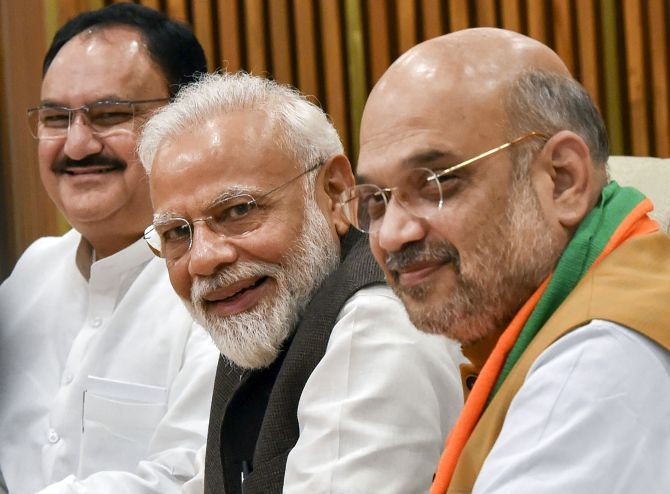
BJP taking layered, ‘scientific’ approach to win third term in 2024
Party assessing sitting MPs, gauging voter mood, and focussing on seats where it stands a good chance

With almost a year left for the 2024 general elections, the BJP is not in a mood to take its chances against a united Opposition. On Friday, Opposition parties led by Nitish Kumar are meeting in Patna to work towards a united front to end the 10-year rule of Prime Minister Narendra Modi.
The BJP leadership is conducting a nationwide assessment as a first step to take stock of its electoral preparedness, under the direct supervision of Union Home Minister Amit Shah and BJP president JP Nadda. The basic idea is to get a first-hand assessment of all the 303 parliamentary constituencies that the party won in the 2019 Lok Sabha polls.
Also read: The Deve Gowda interview: Why JD(S) won’t attend big Opposition meet in Patna
“The BJP leadership has asked us to give detailed reports on the performance of parliamentarians who were elected in 2019 and also the opinion of party workers and people of the constituencies about the elected representatives,” a senior BJP leader involved in the field survey told The Federal. “It is a very exhaustive process, and it is being monitored very closely.”
Three-pronged evaluation
It is interesting that the first part of the nationwide assessment is to check the performance of sitting MPs of the BJP. The second step is to find out the reach of the populist programmes of the Union government, especially those related to subsidised cooking gas cylinders, housing for all, and the construction of toilets. The third step in this direction is the preparedness of polling booth committees in all constituencies.
“We expect that Opposition leaders will try to corner the BJP in almost all constituencies. The Opposition plans to make it a joint contest by fielding one candidate against the BJP. So we are also preparing for the contest. We have to assess the sitting candidate and see if the MP can defeat the Opposition candidate with the help of the party,” the leader quoted above said.
Winnability of sitting MPs
Senior leaders of the BJP elaborated that the party has divided all the 543 constituencies into smaller groups of 8-10 Lok Sabha seats, and each small group has been given a BJP leader who is not from that state. BJP leaders believe that the idea of the central leadership is to assess the performance of sitting MPs and their winnability in the 2023 polls.
Also read: 7 things to watch out for at June 23 Opposition meeting in Patna
“The entire exercise of this nature is to find out if we will be able to retain the seats that we won in the 2019 general elections. It is also to ascertain the demands of the people because their feedback will get incorporated in the election strategy and also in the party manifesto or the electoral promises that will be made by the party during the Lok Sabha elections,” the BJP leader added.
Second-position constituencies
While making efforts to retain its sitting seats and not let the Opposition make inroads in those constituencies, senior leaders of the BJP have also identified 68 Lok Sabha seats in the country where the party came second in the 2019 polls.
Senior party leaders are of the opinion that the BJP should try to win these 68 seats with careful planning and a good selection of candidates, who could be asked to start preparing for the elections early.
“There are 68 seats, mainly in Uttar Pradesh, West Bengal, Odisha, Assam, Chhattisgarh, and Telangana, where the party stood second in the general elections. We are carefully planning ways to identify the right strategy so that the BJP can win these seats. A win in some of these constituencies can help BJP increase its tally in the 2024 polls,” the BJP leader added.
Efforts to scale up seat count
The increase of 21 seats for the BJP in the 2019 polls from the previous performance of 2014 mainly came from West Bengal and some regions in Odisha and Telangana, where it won eight and four seats, respectively. The party is also focussing on its efforts in Maharashtra, where it has MPs in 23 of the total 48 seats.
“We are making efforts so that Shiv Sena is also able to retain its 18 seats which it had won in the 2019 polls. Maharashtra will be a stiff contest because we are against a coalition of three Opposition parties,” the BJP leader said.
Also read: Dalit leaders Mayawati and Manjhi opting out of alliance could hurt Opposition
Political analysts point out that the approach of the BJP is scientific, and it is trying to correct its mistakes in areas where it came second to improve its position in the upcoming general elections.
“This is a very scientific approach to go about identifying your own weaknesses before the crucial elections in 2024,” SK Dwivedi, Lucknow-based political analyst and former head of the political science department at Lucknow University, told The Federal.
“The BJP is not only trying to assess its own performance in the Lok Sabha polls, but also targeting seats where it missed out or came in second. It is possible that if the BJP is able to carefully plan its election strategy, it could benefit from such an approach,” added Dwivedi.

